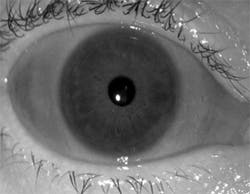Iris aging raises issues about recognition accuracy
Since the early days of iris recognition technology, it has been assumed that the iris was a biometric that would remain stable over the lifetime of an individual. However, new evidence from researchers at the University of Notre Dame (Notre Dame, IN, USA) proves that is not the case.
Notre Dame's Professor Kevin Bowyer has found that the human iris is susceptible to aging, and because it is, it can affect the ability of iris recognition systems to identify an individual from an iris scan.
Iris recognition systems are already used for security in various airports and border crossings, including London airports, Schiphol (Amsterdam) airport, and border entry in the United Arab Emirates.
But despite the results of his study, Bowyer believes there are ways that the problem of iris aging can be addressed -- one is to perform some type of re-enrollment process. In the long term, he says, researchers may develop new iris scanning approaches that are 'aging-resistant.'
Bowker presented his results at the IEEE Computer Society Biometrics Workshop, June 17, 2012. A copy of the paper is available online here.
-- Dave Wilson, Senior Editor, Vision Systems Design
